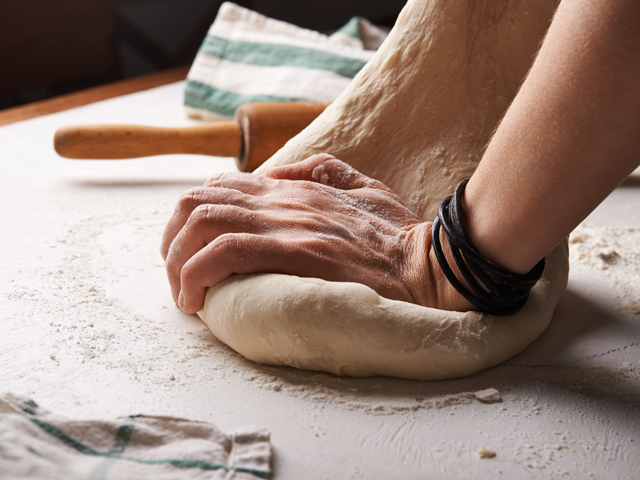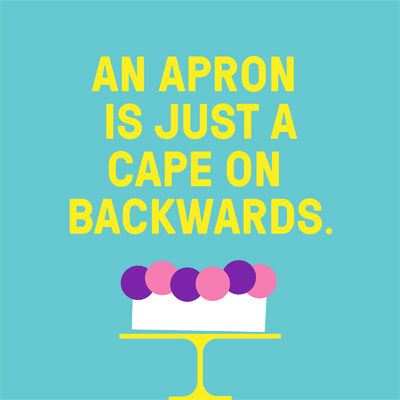Raise Dough for ReachOut Interview

Baking Is Good For Your Mental Health
Join the army of chefs, packet mix masters and everyone in between to bake the world a better place this May.
ReachOut's annual fundraising event Raise Dough is happening again this May.
This May, ReachOut is inviting everyone to get in the kitchen, get mindful and Raise Dough so that ReachOut can continue to connect more young people with its frontline mental health services.
Throughout May participants can host a good old-fashioned bake sale or an event at their home or workplace. There's also an opportunity to go digital and take orders from mates online for a signature bake item. To get involved visit: RaiseDough.com.au.
Raise Dough is an opportunity for the community to throw their support behind the one in four people in Australia aged 14–25 who live with a mental health difficulty.
A number of well-known chefs are getting in the kitchen to Raise Dough this year including Ed Halmagyi (aka Fast Ed).
CEO of ReachOut, Ashley de Silva, said Raise Dough is simple to get involved in and a good excuse to get mindful.
"We're excited to get thousands of people across Australia baking to Raise Dough in support of young people's mental health this May. Raise Dough is simple to be get involved in, and I'm putting it out there right now that there's no shame in packet mixes!"
"70 percent of young people in Australia living with a mental health difficulty don't get the help they need. All of the dough raised this May will help ReachOut to provide free digital support to even more young Australians who need help right now," he said.
Whatever you choose to cook this is not only about fundraising, it's also an opportunity to switch off from technology and distractions and bring a little mindfulness into your day."
For more information about Raise Dough visit RaiseDough.com.au.
For more information about ReachOut visit ReachOut.com and ReachOut.com/Parents
 Interview with Jackie Hallan, Senior Manager at ReachOut
Interview with Jackie Hallan, Senior Manager at ReachOut
Question: Can you tell us about Raise Dough for ReachOut?
Jackie Hallan: This May, ReachOut is calling on people across Australia to get in the kitchen to Raise Dough for young people when it comes to their mental health. Raise Dough is an opportunity for the community to throw their support behind the one in four people in Australia aged 14–25 who live with a mental health difficulty. So, let's bake the world a better place!
Question: How can Australians support the Raise Dough campaign?
Jackie Hallan: Participants can host a bake event at their home, a bake stall at their workplace or even take orders online. Raise Dough is easy to get involved in for everyone from professional bakers through to packet mix masters. Register and start fundraising here.
Question: What services does ReachOut offer?
Jackie Hallan: ReachOut is a digital mental health service for young people and their parents. ReachOut and ReachOut Parents are available 24/7, are totally free and all you need to get started is your phone or computer. Young people can access articles, videos, stories, self-help tips and even get peer support in the forums. Plus, there's lots of content for parents so that they can feel properly equipped to support their teenagers including a free telephone coaching service. There are so many topics covered on ReachOut, including things like how to cope when it comes to exam stress or how to support your teenager if they're being bullied.
Question: How does baking help our mental health?
Jackie Hallan: We all know that cake is delicious! But did you know that baking can actually be good for your mental health? Baking is relaxing and can help when it comes to things like anxiety because it forces you to concentrate on the task at hand. It can help build your resilience, let's be because most of us have had a disaster or two in the kitchen! Plus if you're cooking for others or for a cause it can help connect you with your family, friends and even the wider community.
Question: What else can we do, to support our own mental health?
Jackie Hallan: Some things that we know are great for our wellbeing include regular exercise; making time for hobbies or things we love doing be it cooking, taking some time out by bingeing on Netflix or something creative like painting; and practicing gratitude which could be as simple as noting the three best things of your day on your commute home.
Question: What signs and symptoms should parents look for regarding the mental health of their children?
Jackie Hallan: We know that parents are often a great source of support for young people. But it can be difficult for parents to always know what's going on in their teenagers' lives, in particular when it comes to situations they might not have experienced themselves - like cyberbullying.
One of the most important things parents can do is have open and honest conversations with their teenagers. This could mean sitting down to chat, it could be raising the topic in the car when you're both relaxed, or it could even be via email.
A great tool parents can use to regularly check in with their teenager is the wellbeing score. Parents can ask their teenager to note how they're feeling that day with 0 being terrible and 10 being the best. Over time parents can keep track of how their teenager is doing, notice if the score changes dramatically, notice if there is a decline and seek help or extra support when needed.
Parents can also share links to ReachOut content that they think might resonate with their teenagers, for example ReachOut's how are you going quiz.
 Question: What advice do you have for approaching a conversation around a suspected mental health condition, with a loved one?
Question: What advice do you have for approaching a conversation around a suspected mental health condition, with a loved one?
Jackie Hallan: Supporting someone when it comes to their mental health can be daunting, but importantly it also could have a very positive impact on that person's wellbeing. As a first step, simply asking someone how they are feeling can be very powerful. It's important to make sure you're both calm, choose a quiet and private space to talk, listen without judgement, don't try to fix the problem and to remember that they might not be ready to talk yet.
If you're feeling nervous about the conversation it can be a good idea to do some research online before you start the conversation and to make a list of some support services that you can share with your loved one if they indicate that they are ready to seek help.
It's also important to look after yourself. If you think you might be upset after a difficult conversation with a loved one try to plan an activity that can help you get back into a positive mindframe like going for a walk, trying out a free online meditation or reading a good book.
Question: What will you be baking for Raise Dough for ReachOut?
Interview by Brooke Hunter
Photo by Nadya Spetnitskaya on Unsplash
MORE



